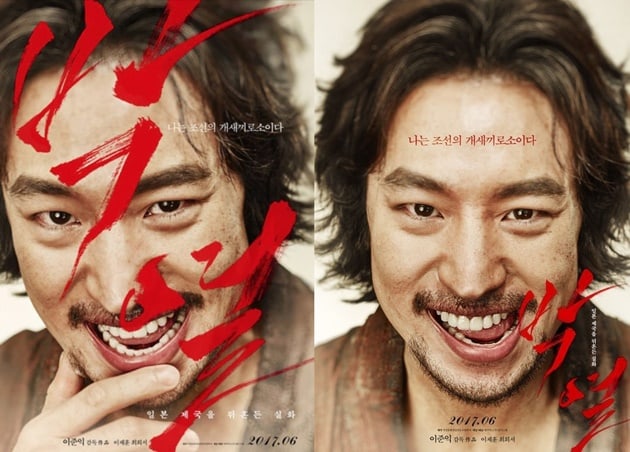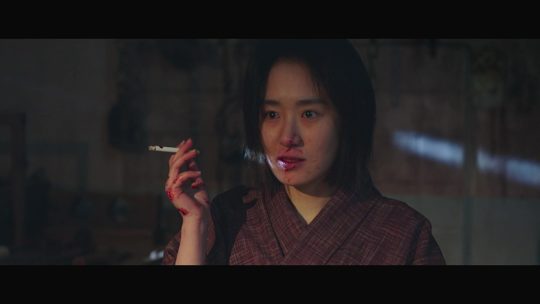
Tap Into Korea's Rich History: Reasons To Watch Lee Je Hoon's "Anarchist From Colony"
The early 20th-century was a period of serious unrest in Korean history. At that time, the two Koreas were one and Japan occupied the nation. Although tragic, such a rich time period provides so much fodder for cinema, which is something that Director Lee Joon Ik taps into. This director is known for diving into period films and was behind the camera for “Dongju: The Portrait of a Poet” and “The Throne.” In “Anarchist from Colony,” powerhouse actors Lee Je Hoon (as Park Yeol) and Choi Hee Seo (as Kaneko Fumiko) join him to tell the tale of Park Yeol, a revolutionary activist and poet. Beside Park Yeol was a Japanese woman just as strong he, Kaneko Fumiko, and together they worked with their fellow activists to pave the way for Koreans.
Grab a snack, a pillow, and sit down to enjoy “Anarchist from Colony” on Viki, which you will enjoy for these five amazing reasons!
1. History is brought to life


This may seem silly to say about a period film because period pieces are all about bringing the past to life, but in the case of “Anarchist from Colony,” beautiful mementos from that time creep into the texture of the film and take root, grounding it in the past while it blossoms on our screens. The most blatant example of this is the poster, which is based on a famous photo of the Park Yeol/Kaneko Fumiko couple. Lee Je Hoon and Choi Hee Seo recreate the intimate pose of the historical lovers with caring attention to detail that is found throughout the film. Old, crackling recordings of famous trot tunes sound occasionally in the background, placing us back in that tumultuous time period. Gritty clarity of filming captures the filth of the streets and the cruelty Koreans and Korean-supporters were subjected to. Director Lee spares little in an honest creation of the poor situations that these people were forced into and that gave rise to Park Yeol, the Bulryeongsa, and other activists and organizations. As a history junkie myself, watching a director’s imagination come to life helps me in my own enjoyment of his recreation.
2. A touch of the fantastic



Although Park Yeol was a real man who did very important things for his country, we also weren’t physically present for his heroics. Neither was the production team. This is where imagination and creativity come into play. Rather than portray Park Yeol as a stoic avenger of the people’s rights, this Park Yeol is quite, well, silly! He leads a group of men who don’t quite seem to know what they’re doing. They are young, passionate, and a tad ineffective, which adds a bit of levity into this otherwise somber tale. Both Yeol and Fumiko are are characterized in a way that doesn’t quite seem revolutionary. Fumiko often wears a grin that we later learn belies her passion for the equality of all people regardless of nation. Park Yeol indulges in poetry, Fumiko, and frivolity, but beneath that is a man who will literally go to jail and give up his life for the rights of his people — which is the stuff of greatness.
Let’s not forget the ultimate villain of the story, who Director Lee characterizes as a man who hates anything and everything Korean: Minister of the Interior Mizuno, played by Japan-born Korean actor Kim In Woo. Mizuno is a man who seems less imperialistic than he does completely self-absorbed. He manipulates each situation to serve himself at the expense of an entire body of people. Men and women like this do exist in history, but this is one very scary imagining — especially because this version of Mizuno doesn’t seem particularly bright.
Near the end of the film is when the levity evaporates and the more serious elements come into play. It’s also where the re-imagining really feels personal. A large trial to determine whether or not Park Yeol is a traitor takes place, and as time passes, these characters slowly lose their shiny veneer of happiness. This is where the portrayal of this story really begins to shine and that ‘touch of the fantastic’ shows its fingerprint.
3. Multi-talented Choi Hee Seo


This actress has mostly shown her lovely face in film and has worked once before with Director Lee on “Dongju: The Portrait of a Poet.” What is so great about this actress is that she is brilliant both in mind and in presence. Multilingual, well-traveled, well-schooled, and extremely talented, Choi Hee Seo was an excellent casting choice for a revolutionary, and not just for her fluent Japanese skills. She is able to take a Japanese woman who empathizes with the Korean plight and give her spunk and tenacity rather than make her seem overly evangelistic. Her rapport with co-star Lee Je Hoon is sizzling, which is exactly what is needed in such an intimate relationship. I’m not just talking about Fumiko and Yeol as lovers, but as comrades in a battle for the rights of people. Very much like film and drama lovers come together from all across the world in an understanding of a beautiful culture, so does Fumiko come together with Yeol and the Bulryeongsa.
I didn’t quite expect such a jovial portrayal of this woman, but Choi Hee Seo manages to make it work, mostly because when the time comes, her fiery delivery of the heart of Fumiko’s defiance against the Japanese government is mind blowing.
4. Movie King Lee Je Hoon


It would be remiss of me not to mention Lee Je Hoon, who has been leaving an indelible footprint on the film industry with films like “Architecture 101” and “Phantom Detective.” You’ll also see him on the small screen in dramas like “Tomorrow With You” and “Signal.” Everything this man is in is better for it. He has a knack for quirky characters and for wrenching emotions from the gut. His Park Yeol is frankly one strange dude, to put it lightly. He lacks class, tact, and is rather clumsy, but his poetry brings in the ladies, his revolutionary ideas bring him comrades, and his bravery puts him down in history. Such a quirky portrayal is par for the course with Lee Je Hoon and with Director Lee Joon Ik. But this isn’t necessarily a bad thing. Revolutionaries are often portrayed with such gravitas that it’s almost refreshing to see something different. And Lee Je Hoon brings it when he has to, let me tell you. The court room and the subsequent scenes are tear-inducing in their strength, which speaks to his talent.
5. Patriotism


Each of us has a home country, a native tongue, a history, and people in the background who have fought to make our homes better places. That feeling of patriotism is something everyone can understand. I feel it about my home country and my native tongue and my history.
Although this is a film about Korean patriotism, it’s easy to identify with Yeol’s and Fumiko’s desire for something greater for both Korea and Japan. They both want the freedom of Korea and for Japan to be the place they know it can be. These two don’t villainize Japan; rather, they dissent with the politics and the leaders, which is an important distinction for an influential film to make. Like I mentioned, it’s a solvent message to send, but especially pertinent to the Soompi audience that is composed of fans from all over the world. We can get behind a story that stems from real lives and real happenings.
Aside from these five reasons, there are so many more to watch “Anarchist from “Colony,” but I’ll stop myself here so that you can get watching on Viki.

Click below to watch “Anarchist from Colony”:
Raine0211 is a lover of all things Korean, especially K-pop, K-drama, and Korean food. When she’s not writing for Soompi, she’s playing the cello and singing. She happily indulges in all kinds of K-pop, but her biases are SHINee, Infinite, and VIXX. She lives with her sister and her two cats, Timmy and Momo, all of whom also love K-pop and K-drama.